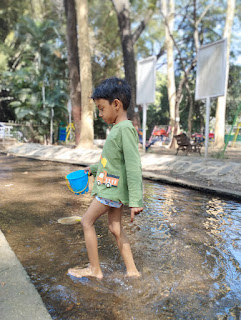"The Neglected Gardens: A Call for Better Maintenance"
It’s disheartening to see how public gardens, designed for children’s play and community relaxation, are often neglected when it comes to maintenance. One such example is the garden at Jagtap Chowk, Pune.
Gardens and parks are more than just places for children to burn off energy. These spaces provide vital opportunities for kids to develop physical strength, coordination, and social skills through outdoor play. Running, climbing, and playing freely in a safe, open environment is crucial for their overall growth and mental well-being. Playgrounds also offer kids a chance to connect with nature and foster creativity, an experience that screens and indoor activities can never fully replicate.
Unfortunately, over four months ago, a storm left this play area in shambles after trees fell, damaging the equipment. Since then, the broken parts remain scattered, posing severe safety risks to children. Yet, despite the obvious dangers, nothing has been done to repair the damage. Local authorities have shown no sign of addressing the issue.
What’s even more alarming is the passive attitude of some visitors. Parents continue to bring their children to play, using the few slides that remain operational, seemingly accepting the garden's condition as unchangeable. When asked, they simply replied, "What can we do? It seems it will never be repaired."
It’s a sad reality in many public gardens. Every new park opens with grand ceremonies and fanfare, but as time passes, maintenance falls to the bottom of the priority list. Our parks should be spaces where children play safely, where communities come together, and where nature is preserved—not left to decay.
It’s time for local authorities to take this issue seriously and ensure regular, vigilant maintenance of public parks. Our children deserve safe and well-maintained play spaces.
Parents facing a similar concern , please comment below and let's raise our voices for a better play area for our children.
I encourage parents who are facing similar issues in their local parks to speak up and not remain silent. Leave a comment below to share your experiences, and together, let’s raise our voices to ensure safe play spaces for our children.
#PublicParksMatter #PuneCity #ParkSafety #ChildrensPlayground #NeglectedGardens #SafeParksForKids #ParksAndPlaygrounds #GovernmentResponsibility #CommunityFirst #PlaygroundMaintenance





























